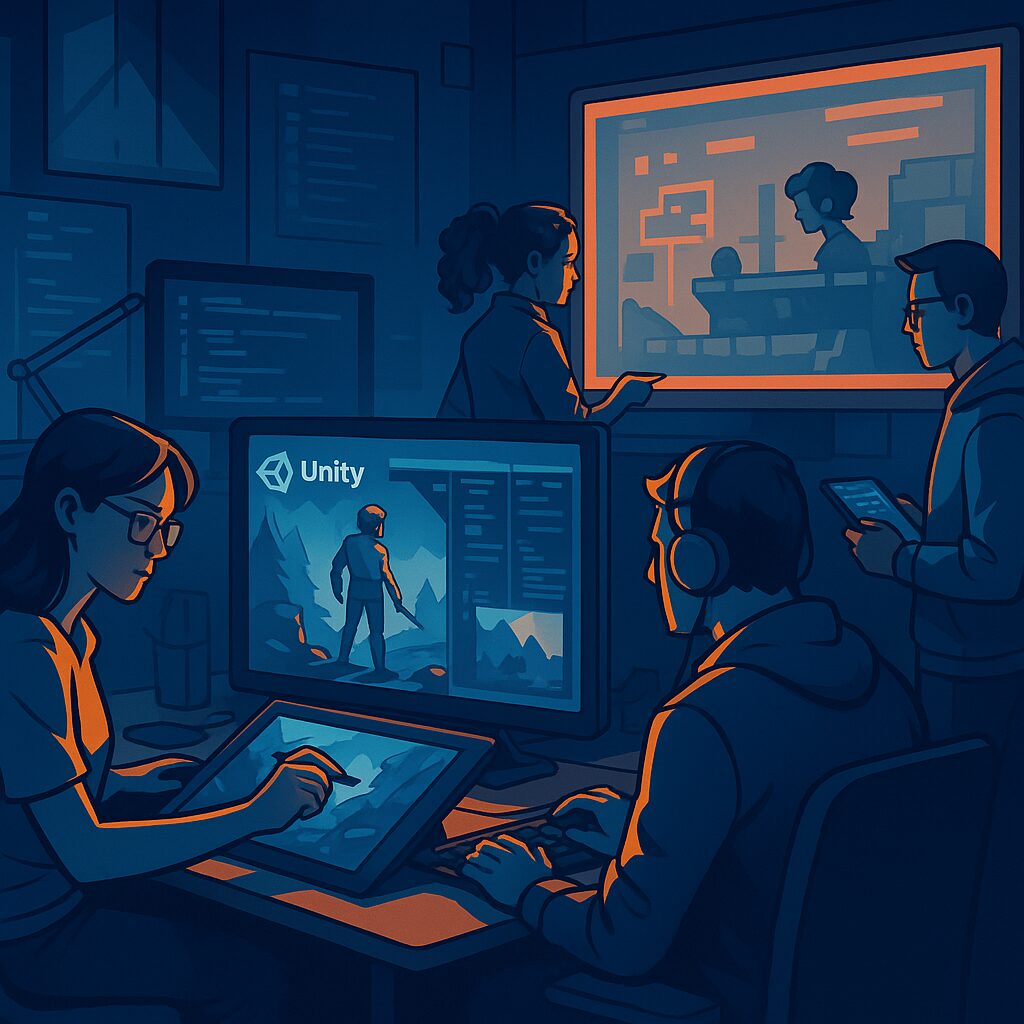In today’s fast-paced gaming industry, innovation and efficiency are critical for success. Game studios of all sizes are constantly seeking ways to create high-quality, immersive experiences for players across multiple platforms. One of the biggest drivers of this progress is the rise of unity game development companies – specialized teams that leverage the Unity Engine to design, develop, and deliver exceptional games faster and more cost-effectively than ever before. Unity has transformed the way games are made. With its flexibility, scalability, and cross-platform capabilities, it empowers developers to turn creative ideas into fully realized projects that run seamlessly on mobile, PC, consoles, and VR devices.
Why Unity Dominates Modern Game Development
Unity’s widespread adoption is no coincidence. Its powerful yet user-friendly interface makes it accessible to both indie creators and AAA studios. The engine’s modular architecture, vast Asset Store, and advanced rendering pipelines (URP and HDRP) enable developers to produce visually stunning, optimized experiences for any device.
Unity also supports real-time 2D, 3D, AR, and VR development, giving creators freedom to experiment with new genres and technologies. Its C# scripting, integrated physics system, and extensive documentation make it one of the most developer-friendly engines available today. For these reasons, more companies are partnering with unity game development companies to harness Unity’s full potential and streamline their production workflows.
The Role of Unity Game Development Companies
Creating a successful game involves a complex process that spans multiple disciplines – programming, art, design, audio, testing, and optimization. Hiring and managing a large in-house team can be expensive and time-consuming. This is where Unity outsourcing partners step in.
Unity game development companies specialize in providing end-to-end solutions or assisting with specific parts of a project. Their services often include concept design, prototyping, asset creation, animation, coding, porting, and post-release support. With access to global talent and advanced pipelines, these teams help studios deliver top-tier products while staying on budget and on schedule.
Key Advantages of Partnering with Unity Game Development Companies
1. Cross-Platform Expertise
Unity’s biggest advantage is its ability to deploy games across more than 25 platforms – from mobile devices to consoles and VR headsets. Outsourcing partners are skilled in optimizing performance and adapting gameplay mechanics for each target platform.
2. Cost and Time Efficiency
Maintaining a full-time internal team requires substantial overhead. Outsourcing to Unity specialists eliminates recruitment, training, and operational costs. Studios pay only for the services they need, accelerating production and maximizing ROI.
3. Access to Global Talent
Top unity game development companies employ multidisciplinary teams of artists, engineers, and designers from around the world. This diversity enhances creativity and ensures that every project benefits from fresh ideas and technical expertise.
4. Focus on Core Creativity
By outsourcing technical or repetitive tasks, developers can focus on core creative goals – storytelling, world-building, and game mechanics – while external teams handle production details.
5. Scalability and Flexibility
Outsourcing allows studios to scale up during intensive phases (like level design or testing) and scale down afterward. This flexibility keeps projects lean and efficient.
Services Offered by Unity Outsourcing Studios
- Full-Cycle Game Development – From concept to launch, Unity partners handle planning, design, programming, QA, and post-release updates.
- AR and VR Solutions – Unity excels in immersive experiences, making it ideal for AR/VR games, training apps, and simulations.
- Art and Animation Production – Creation of 2D/3D assets, environment modeling, rigging, and cinematic animation.
- Game Porting and Optimization – Adapting existing titles for new platforms while maintaining stability and quality.
- UI/UX Design and Gameplay Enhancement – Crafting intuitive interfaces and balancing user experience.
- Quality Assurance (QA) – Comprehensive testing to eliminate bugs, improve performance, and ensure smooth player interaction.
How to Choose the Right Unity Partner
Selecting the ideal development partner requires careful consideration. Start by evaluating the company’s portfolio – look for projects that match your desired genre and quality level. Review client testimonials and assess technical skills, especially experience with Unity’s latest systems (like DOTS or URP).
Effective communication is also key. The best unity game development companies maintain transparent workflows with regular progress updates, milestone tracking, and shared project-management tools such as Jira or Trello.
Security is another critical factor. Always ensure your partner follows strict NDAs and data-protection protocols to safeguard your intellectual property.
Challenges in Outsourcing Unity Development
Despite its advantages, outsourcing comes with challenges such as time-zone differences, cultural barriers, and potential creative misalignment. Successful partnerships overcome these by setting clear goals, maintaining open communication, and using detailed documentation and version-control systems (like GitHub). When managed properly, outsourcing doesn’t dilute creative control – it enhances it by combining global perspectives and technical mastery.
The Future of Unity Game Development
Unity’s influence extends far beyond gaming – into architecture, film, education, and virtual production. Its real-time 3D technology is reshaping digital storytelling across industries. As innovation accelerates, unity game development companies will remain central to this transformation. They bridge the gap between creativity and technology, enabling studios to deliver engaging, cross-platform experiences faster and more efficiently.
